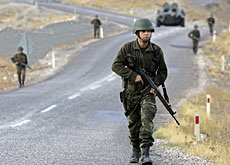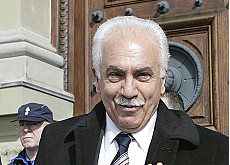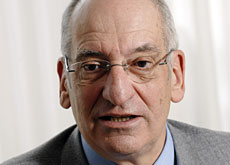Volatile Kurdistan threatens regional peace

A conference hosted by Turkey on improving regional security has been overshadowed by the fall-out from Kurdish militant attacks launched from Iraq.
Two Swiss researchers say that that the risk of all-out military action by the Turks against the guerrilla movement is low, but warn that the situation in Iraq remains volatile.
“Our objective is to have an Iraq that has stability and safety and that does not create threats for its neighbours,” Turkish Prime Minister Tayyip Erdogan said at the conference’s opening session.
UN Secretary-General Ban Ki-moon told the meeting of dozens of foreign ministers, held in an Ottoman palace on the banks of the Bosphorus, that the attacks staged from Iraq were “unacceptable”.
He also urged Iraq’s neighbours to do more to help stabilise Iraq, which sits on the world’s third-largest proven crude oil reserves, and said recent incidents on the Turkish-Iraqi border showed the need for close cooperation.
Erdogan’s government has come under tremendous pressure to act after Kurdish PKK militants killed dozens of Turkish soldiers in recent cross-border attacks. Turkey has threatened to send troops into Iraq if no measures are taken by Baghdad.
Swiss Middle East specialist Yves Besson says the Turks have little choice but to flex some of their military muscle.
“The government needs to show citizens that it is prepared to stand firm when defending Turkey’s national interests,” he told swissinfo. “The nationalists and the army have questioned the [moderate Islamist] government’s legitimacy.”
Several thousand people protested in the capital Ankara on Saturday, the latest in a series of demonstrations against the Kurdish attacks and demanding action from the authorities.
Sociologist Hasan Mutlu says these protests reflect changes taking place in Turkish society, which is becoming more urbanised but also seeking guidance. This has led citizens to either cling to the country’s nationalist past, or embrace the emergence of Islamism.
Fears of independence
Besson adds that the Turkish government has always claimed it wanted to protect some minorities living in Iraqi Kurdistan, but that it possibly fears the creation of an independent Kurdish state.
“Saddam Hussein had chased the Kurdish population of [the regional capital] Kirkuk away, but since his fall these people have returned against the wishes of the Iraqi government,” he said.
“Ankara is worried that Kurds will once again become the majority and become economically and politically independent thanks to the region’s oil. Turkey has already warned it would not accept this outcome.”
For the time being, the Turks want to deal with the members of the PKK militant group installed in Iraq. Especially as more and more Kurds see autonomy for their region as a realistic option, added Mutlu.
Besson warns the Turks have to worry about the ambitions of Iraq’s other neighbours as well.
“For the moment, Turkey will probably settle for one-off operations in Iraq,” he said. “But if the situation gets worse, they might go further saying further intervention was required to restore law and order.”
swissinfo, Frédéric Burnand
More than 74,000 Turkish citizens lived in Switzerland in 2006, but this figure does not take into account dual nationals or naturalised Turks.
According to Hasan Mutlu, the total number of Swiss Turks would closer to 110,000, including 10,000 to 30,000 Kurds.
Most of these Turks live in the area between Basel, Zurich and Solothurn.
The Kurdistan Workers Party or PKK is an armed militant group founded in the 1970s and led by Abdullah Öcalan until his capture in 1999.
The PKK’s ideology was founded on revolutionary Marxism-Leninism and Kurdish nationalism. Its goal has been to create an independent socialist Kurdish state in a territory which it claims as Kurdistan, an area that comprises parts of southeastern Turkey, northeastern Iraq, northeastern Syria and northwestern Iran.
It is considered to be an ethnic secessionist organisation that uses force and the threat of force against both civilian and military targets to achieve its political goal.

In compliance with the JTI standards
More: SWI swissinfo.ch certified by the Journalism Trust Initiative



You can find an overview of ongoing debates with our journalists here. Please join us!
If you want to start a conversation about a topic raised in this article or want to report factual errors, email us at english@swissinfo.ch.